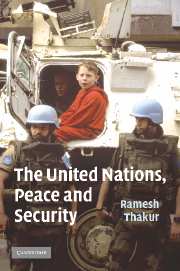Book contents
- Frontmatter
- Contents
- List of figures
- List of tables
- Foreword, Gareth Evans
- Acknowledgements
- Introduction
- PART I An international organisation for keeping the peace
- 1 Pacific settlement, collective security and international peacekeeping
- 2 Peace operations and the UN–US relationship
- PART II Soft security perspectives
- PART III Hard security issues
- PART IV Institutional developments
- Conclusion: at the crossroads of ideals and reality
- Index
2 - Peace operations and the UN–US relationship
Published online by Cambridge University Press: 24 May 2010
- Frontmatter
- Contents
- List of figures
- List of tables
- Foreword, Gareth Evans
- Acknowledgements
- Introduction
- PART I An international organisation for keeping the peace
- 1 Pacific settlement, collective security and international peacekeeping
- 2 Peace operations and the UN–US relationship
- PART II Soft security perspectives
- PART III Hard security issues
- PART IV Institutional developments
- Conclusion: at the crossroads of ideals and reality
- Index
Summary
The Iraq War in 2003 brought to a head a sometimes troubled and uneasy relationship between the world's premier international organisation and its most important member state. The whole affair generated heated controversy about the system of multilateral governance centred on the United Nations and the capacity and propensity of the USA to embark on unilateral adventures. The tension between the competing imperatives to unilateralism and multilateralism in US foreign policy has long bedevilled relations between the UN and the USA with respect to international peace operations, well before the advent of the administration of President George W. Bush. This chapter will seek to demonstrate that the critical UN–US relationship in fact soured over the course of the 1990s with respect to a range of peace support operations. This forms the necessary backdrop to understanding the ill-tempered UN–US exchanges of 2002–5.
The UN Security Council (UNSC) is the proper locus of authorising and legitimising the creation, deployment and use of military force under international auspices. The major powers were given permanent membership of the UNSC and the veto power in recognition of their special role and responsibility in underwriting world order and collective security. When collective security proved unattainable and peacekeeping emerged as a substitute technique for keeping the major powers out of competitive involvement in armed conflicts, direct military involvement by the five permanent members (P5) of the UNSC was not welcome. But they still had to consent to the creation, deployment and financing of UN peacekeeping missions.
- Type
- Chapter
- Information
- The United Nations, Peace and SecurityFrom Collective Security to the Responsibility to Protect, pp. 48 - 68Publisher: Cambridge University PressPrint publication year: 2006



